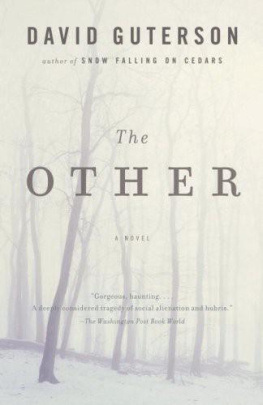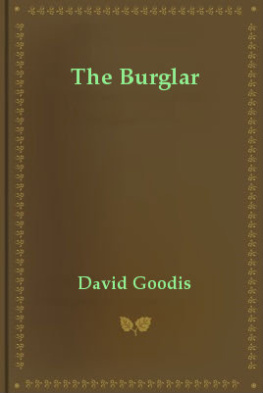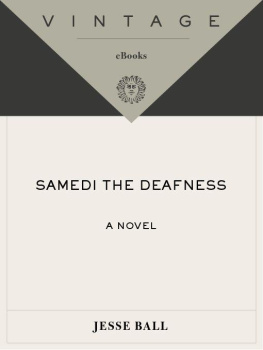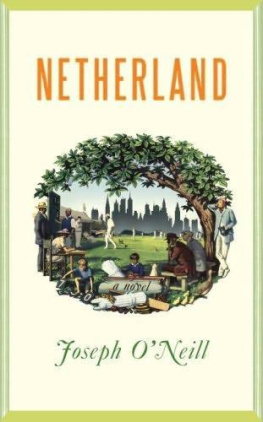David Guterson - The Other (Vintage Contemporaries)
Here you can read online David Guterson - The Other (Vintage Contemporaries) full text of the book (entire story) in english for free. Download pdf and epub, get meaning, cover and reviews about this ebook. year: 2009, publisher: Vintage, genre: Detective and thriller. Description of the work, (preface) as well as reviews are available. Best literature library LitArk.com created for fans of good reading and offers a wide selection of genres:
Romance novel
Science fiction
Adventure
Detective
Science
History
Home and family
Prose
Art
Politics
Computer
Non-fiction
Religion
Business
Children
Humor
Choose a favorite category and find really read worthwhile books. Enjoy immersion in the world of imagination, feel the emotions of the characters or learn something new for yourself, make an fascinating discovery.
- Book:The Other (Vintage Contemporaries)
- Author:
- Publisher:Vintage
- Genre:
- Year:2009
- Rating:5 / 5
- Favourites:Add to favourites
- Your mark:
- 100
- 1
- 2
- 3
- 4
- 5
The Other (Vintage Contemporaries): summary, description and annotation
We offer to read an annotation, description, summary or preface (depends on what the author of the book "The Other (Vintage Contemporaries)" wrote himself). If you haven't found the necessary information about the book — write in the comments, we will try to find it.
The Other (Vintage Contemporaries) — read online for free the complete book (whole text) full work
Below is the text of the book, divided by pages. System saving the place of the last page read, allows you to conveniently read the book "The Other (Vintage Contemporaries)" online for free, without having to search again every time where you left off. Put a bookmark, and you can go to the page where you finished reading at any time.
Font size:
Interval:
Bookmark:

CONTENTS
To A.S.C., A.V.S., and D.W.B.
Je est un autre.
Rimbaud
N O E SCAPE FROM THE U NHAPPINESS M ACHINE
I ATTENDED R OOSEVELT (the Teddies, Teds, or Roughriders), a public high school in North Seattle, while my friend John William Barry was a student at Lakeside, our citys version of an East Coast private academy like Phillips Exeter or Deerfield. Besides slumping at my desk all day and getting high in Cowen Park at lunch, I also ran the 880today called the eight-hundred-meter or the half-milefor the RHS track team. It was a good niche for me. You didnt need to be fast or have the wind of the distance runner. Mostly what you needed was a willingness to sign up. As a sophomore in 1972, I was a good enough half-miler to represent RHS with a time of 2:11.24. To put this in context, the world record in 72 for the half-mile was held by Dave Wottle, with a time of 1:44.30. Roosevelts best half-miler of all time is Chris Vasquez, 97, at 2:01.23. This is a race that takes runners twice around the red cinder oval found behind many high schoolsI say this so you can imagine me losing to Vasquez by about thirty yards, or think of me still rounding the last bend, at the far end of the grandstands, while Wottle is crossing the finish line, arms raised victoriously. Either is a useful picture of meof someone intimate with the middle of the pack. Theres good and bad in that.
I remember one race more vividly than others. Its 72, so Nixon is president, though he and everything else, the world, seem far away from Seattle. Im sixteen and wear my hair like Peter Framptons and a mustache like Steve Prefontaines. (Because of this mustache, Im sometimes referred to at school as the Turk, after the guy in the Camel cigarette ads. Im not Turkish, but my mothers father, whom I never met, was what people call Black Irish, and possibly I inherited his coloring.) Ive got on hi-cut satin shorts and a satin jersey emblazoned with Roughriders, and Im at the starting line along with seven other runners, six with better qualifying times than mine. Despite them, Im a believer that if the ninety-nine-pound mother in the apocryphal story can lift the front end of a Volkswagen off her crushed toddler, I can win today.
Ill dispense with the obligation to describe the weatherwhether or not it was a sultry afternoon, with clouds of newly hatched mayflies above the track, or a windless May day smelling of moist turf and mown grass, is beside the pointand cut, literally, to in medias res: the eight of us stalwart and tortured young runners rounding the third curve of a high-school track and coming up on 250 yards. Its my usual MOout front early and counting on adrenaline to keep me there, but with heels nipped and a sinking feeling thats anathema to winning. A race is a conversation with yourself, motivational in quality, until somebody interrupts by pulling away from you, and then it becomes an exercise in fathoming limits. Losing is like knowing that, in the movie scene where a thousand die but the hero lives, youre one of the obliterated.
The right track term is running in a pack. Thats usa band of runners hardly separated. One keeps exhaling humidly on my shoulders. Anothers left forearm hits my right elbow on its backswing. A runner pulls up beside methe way a freeway driver pulls even in the adjacent lane to take your pulseand I assess his chances with a panicked glance. Not strictured yet; striding with more ease than I feel; biding his time; relaxed. Working up a freshly adrenalized surge, I gain a quarter-step on him, but purchased with the last of my reserves.
The early leader in a half-mile race rarely finishes first, but he wants to have had the experience of leadingthats part of itand hes perennially hopeful that, this time, things will be different in the home stretch. I still feel that way entering curve three: that I might have heretofore undiscovered deposits of leg strength and cardiovascular capacity, not to mention will, at my disposal, all this against the grain of my foreboding. It turns out that my foreboding makes sense; at the curves apogee, I know Ill flag, and with that, the flagging happens. Three runners pass me, going strong.
Im needled by regret. Why dont I have a better strategy than running as fast as I can from start to finish? Ive squandered my energy; Ive incurred too large a deficit. But it isnt in me to plan; I just run, as my coach says, on unfocused emotion. These other runners, by the halfway markend of lap one, where were lashed on by friends and exhorted by teammates, a small fire zone of screaming and technical adviceare just stretching out and finding a rhythm, while Im already in a battle with depletion. I drop to sixth, dragging with me a familiar sense of failure.
Then, on the back stretch, the runner in seventh tries to pass me, too. To anybody watching were in a pointless and even pathetic battle between losers, but for me whats happening feels critical. Against good tactical judgmentits a move that slows youI indulge in another assessment of an opponent: like me, long-haired; like me, in earnest; like me, goaded forward by, the word might be, convictions. In other words, this runner is approximately my doppelgnger.
Ask any track coach. The half-mile is a race for unadulterated masochists. Neither a sprint nor a distance event, it has the worst qualities of both. Its not a glorious race, either. A lot of people can name a sprinter or twoCarl Lewis, for exampleor a famous miler like Roger Bannister, but can very many name even a single half-miler? No athletic romance attaches to the half-mile. Its not a legendary or even notable feat to beat other runners over 880 yards. At track meets, the half-mile contest is somehow lost between more compelling competitions, an event that unfolds while fans thumb their programs or use the bathroom. Into this gap of a race, this sideshow, step runners in search of a deeper agony than they can find elsewhere. They want to do battle with suffering itself. Its the trauma they want, the anguished ordeal. Its the approximately two minutes of self-mortification or private crucifixion. All half-milers have a similar love of pain. So this race is an intimation and an opening. In two minutes time, you get a glimpse.
I do, on the afternoon Im telling about. Theres a kind of synchronicity that can happen in a running race, and it happens now. We run in tandem, my near doppelgnger and I. In running parlance, we match strides. Im measuring him, as he, no doubt, is measuring meall the while throwing ourselves forward into fresh pain, so that there are two perceptions, pain and the close presence of another agonized half-miler. In parallel this way, and canceling each other out, were neither of us ahead or behind for maybe forty-five seconds. Thats an unusually long time to run neck and neck in the 880. Im oxygen-deprived, so everything looks well lit and startling, and from this perspective I see what I probably wouldnt see otherwise. This guy, right here, running next to me, is a version of me. We both feel, romantically, that our running is transcendent. How do I know this? From running alongside him. I also have the benefit of hindsight.
Thirty-four years have passed, but I still remember how, in the final five yards, my double frees himselflike a shadow in a cartoon or a mirror-figure in a dreamand beats me by three-quarters of a stride.
Im bent over and spent, my hands on my knees after the race, breathing hoarsely and looking at the ground, when he comes over to shake my hand with what I think at first is a grating sincerity. The grip is vigorous. The expression is heartfelt and, post-race, ruddy. The stance is upright, the posture exclamatory. This is gracious victory personified, and for a moment I thinkit says Lakeside on his jerseythat what Im seeing is obligatory patrician good manners, a valorous lad with his cursory and vapid Victorian Well done! while his heaving breath subsides. But no. Hes just fiercely putting forward what he feelshes honest. Theres a sentiment to be noted, life is short, and he doesnt want to just pass by. Thanks for the push, John William declares, between bouts of sucking wind. I just about died.
Next pageFont size:
Interval:
Bookmark:
Similar books «The Other (Vintage Contemporaries)»
Look at similar books to The Other (Vintage Contemporaries). We have selected literature similar in name and meaning in the hope of providing readers with more options to find new, interesting, not yet read works.
Discussion, reviews of the book The Other (Vintage Contemporaries) and just readers' own opinions. Leave your comments, write what you think about the work, its meaning or the main characters. Specify what exactly you liked and what you didn't like, and why you think so.







